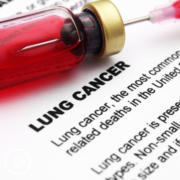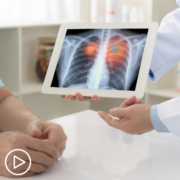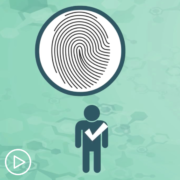Why Non-Small Cell Lung Cancer Patients Should Speak Up About Symptoms and Side Effects
Why Non-Small Cell Lung Cancer Patients Should Speak Up About Symptoms and Side Effects from Patient Empowerment Network on Vimeo.
Dr. David Carbone, a lung cancer expert, emphasizes the importance of speaking up, advocating for yourself, and being an active member of your non-small cell lung cancer health care team.
Dr. David Carbone is a medical oncologist and professor of internal medicine at The Ohio State University. Dr. Carbone is also co-leader of the Translational Therapeutics Program at the OSUCCC – James, where serves as director of the Thoracic Oncology Center. Learn more about Dr. Carbone, here.
See More From INSIST! Lung Cancer
Related Resources:

|

|

|
Transcript:
Katherine:
Patients can sometimes feel like they’re bothering their healthcare team with their comments and questions. Why is it important for patients to speak up, and become a partner in their own care?
Dr. Carbone:
So, it’s a fact that when patients get the diagnosis of lung cancer, everything changes in their lives. They suddenly have a whole new vocabulary thrown at them. It’s like their doctor is speaking French to them. They have to trust their life to a person they’ve never met before, and a whole cadre of people coming in and talking to them and poking them and running through scanners.
It’s very difficult for someone whose biggest concern was what to make for dinner that night, and now has a diagnosis of lung cancer, to really comprehend what’s going on. And lung cancer is complicated, so I recommend that patients really try their best to have at least a basic understanding of what’s going on, where their cancer is. I always show the patient their scans.
“Your cancer is here; this is what it looks like; that’s why you’re having that pain over there, because you have this spot here. Your genetic testing shows this and this, and that’s why it’s important, and that’s why we’re using this drug to match this mutation.” And these are things patients will understand if doctors will explain it to them.
And similarly, the side effects. Lung cancer patients tend to be tough people. They’ll say, “It’s not so bad, I feel better; but the side effect is not so bad. I’m just not going to tell them.” And it even happens in clinic that they’ll tell me they feel fine, and then they’ll tell the nurse that they hurt in their left elbow. And I have to go back in and ask them some more questions on that.
So, it’s extremely important to feel comfortable in communicating with your doctor, asking questions; “Why am I getting this scan? Why are we using this treatment? Is this the best treatment? Are there clinical trials available? I have this new symptom, x, y, z,” because symptoms are often much easier to treat when you catch them early than when you catch them late.
And you don’t get a medal for being a tough guy in this situation. Tell your doctor if you have pain, and they can manage it. Tell them if you’re short of breath, and they can help you feel better. They can’t help you if you don’t tell them, and you are your own best advocate in this situation. Ask questions about the treatment, and why that’s the best one for you; and, as I said, about clinical trials.
Katherine:
Excellent. Thank you so much. It’s important for people to remember that.










